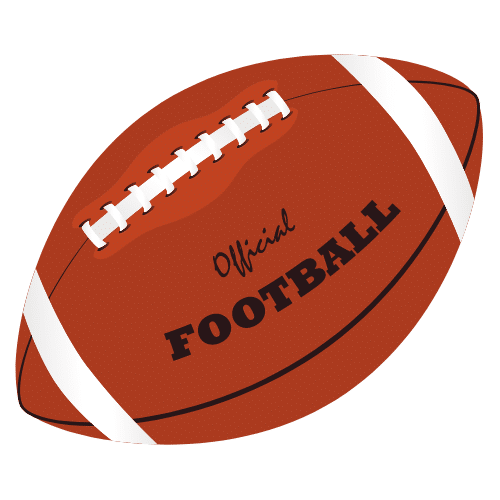Rule 4 - Ball in Play, Dead Ball, Out of Bounds
SECTION 1. Ball in Play – Dead Ball
Article 1 - Dead Ball Becomes Alive
Article 2 - Live Ball Becomes Dead
a. A live ball becomes a dead ball as provided in the rules, or when an official sounds his whistle (even though inadvertently), or otherwise signals the ball dead. (A.R. 4-2-1:II)(A.R. 4-2-4:I)
b. If an official sounds his whistle inadvertently or otherwise signals the ball dead during a down (Rules 4-1-3-k, 4-1-3-m and 4-1-3-n)(A.R. 4-1-2:I-V):
1. When the ball is in player possession, the team in possession may elect to put the ball in play where declared dead or repeat the down.
2. When the ball is loose from a fumble, backward pass or illegal pass, the team in possession may elect to put the ball in play where possession was lost or repeat the down.
Exceptions:
(1) Rule 12.
(2) If the ball goes out of bounds in the immediate continuing action after the inadvertent whistle, then the ball belongs to the fumbling/passing team according to (Rule 7-2-4).
(3) If there is a clear catch, recovery or interception of a loose ball in the immediate continuing action after the inadvertent whistle, then the ball belongs to the recovering team at the spot of the recovery and any advance is nullified.
3. During a legal forward pass or a free or scrimmage kick, then the ball is returned to the previous spot and the down repeated.
Exceptions:
(1) Rule 12.
(2) If, in the immediate continuing action after the inadvertent whistle, a legal forward pass is incomplete (Rule 7-3-7), a free kick goes out of bounds (Rule 6-2) or touches the ground on or behind Team B’s goal line (Rule 6-1-7), a scrimmage kick goes out of bounds (Rule 6-3-7 or 6-3-8) or touches the ground on or behind Team B’s goal line (Rule 6-3-9), then those rules apply as if the inadvertent whistle had not happened.
(3) If there is a clear catch, recovery or interception of the pass or kick in the immediate continuing action after the inadvertent whistle, then the ball belongs to the recovering team at the spot of the recovery and any advance is nullified.
(4) If a scrimmage kick crosses the neutral zone and is untouched by Team B beyond the neutral zone, and if the other exceptions here do not apply, the ball is dead and belongs to Team B at the spot where the kick ends (Rule 2-25-9). If this spot is beyond the neutral zone, the kick has crossed the neutral zone, and postscrimmage kick enforcement will apply if the provisions of Rule
10-2-3 hold. On a field goal attempt, a field goal will be scored if the requirements of Rule 8-4-1 are met.
4. After Team B gains possession on the try or during an extra period, then the try is over or the extra-period possession series is ended.
c. If a foul or violation occurs during any of the above downs, the penalty or violation privilege shall be administered as in any other play situation if not in conflict with other rules. (A.R. 4-1-2:I and II)
Article 3 - Ball Declared Dead
A live ball becomes dead and an official shall sound his whistle or declare it dead:
a. When it goes out of bounds other than a kick that scores a field goal after touching only the uprights or crossbar; when a ball carrier is out of bounds; or when a ball carrier is so held that his forward progress is stopped. When in question, the ball is dead.
(A.R. 4-2-1:II)(A.R. 4-1-3:IX and X)
b. When any part of the ball carrier’s body, except his hand or foot, touches the ground or when the ball carrier is tackled or otherwise falls and loses possession of the ball as he contacts the ground with any part of his body, except his hand or foot. (Exception: The ball remains alive when an offensive player has simulated a kick or at the snap is in position to kick the ball held for a place kick by a teammate. The ball may be kicked, passed or advanced by rule.) (A.R. 4-1-3:I)
c. When a touchdown, touchback, safety, field goal, or successful try occurs; or when a free kick or a scrimmage kick that is untouched by Team B beyond the neutral zone touches the ground in Team B’s end zone (Rules 6-1-7-a and 6-3-9). (A.R. 6-3-9:I)
d. When, during a try, a dead-ball rule applies (Rule 8-3-2-d-5).
e. When a player of the kicking team catches or recovers any free kick or a scrimmage kick that has crossed the neutral zone.
f. When a free kick, scrimmage kick or any other loose ball comes to rest and no player attempts to secure it.
g. When a scrimmage kick or a free kick is caught or recovered by any Team B player after a valid or invalid fair catch signal by a Team B player; or when an invalid fair catch signal is made after a catch or recovery by Team B (Rules 2-8-1, 2-8-2 and 2-8-3).
h. When there is a return kick or a scrimmage kick is made beyond the neutral zone.
i. When a forward pass is ruled incomplete.
j. When, before a change of team possession on fourth down or a try, a Team A fumble is caught or recovered by a Team A player other than the fumbler (Rules 7-2-2-a, 7-2-2-b and 8-3-2-d-5).
k. When a live ball not in player possession touches anything inbounds other than a player, a player’s equipment, an official, an official’s equipment or the ground (inadvertent whistle provisions apply).
l. When there is a simultaneous catch or recovery of a live ball.
m. When the ball becomes illegal while in play (inadvertent whistle provisions apply).
n. When a live ball comes into possession of an official (inadvertent whistle provisions apply).
o. When a ball carrier simulates placing his knee on the ground.
p. When an airborne pass receiver from either team is held so that he is prevented from immediately returning to the ground. (A.R. 7-3-6:III)
q. When a ball carrier’s helmet comes completely off.
r. When a ball carrier obviously begins a feet-first slide. (A.R. 4-1-3:III)
s. When all players in the vicinity of the ball stop playing and/or believe it to be dead.
Article 4 - Ball Ready for Play
No player shall put the ball in play before it is ready for play. (A.R. 4-1-4:I and II)
PENALTY − Dead-ball foul. Five yards from the succeeding spot [S7 and S19: IPR].
Article 5 - Play-Clock Count
ARTICLE 5. The ball shall be put in play within 40 or 25 seconds after it is made ready for play (Rule 3-2-4), unless, during that interval, play is suspended. If play is suspended, the play-clock count will start again.
PENALTY − Dead-ball foul for delay of game. Five yards from the succeeding spot [S21: DOG].



